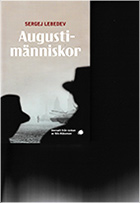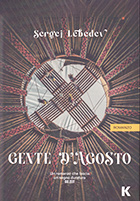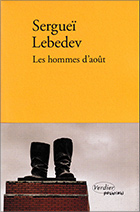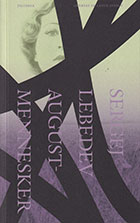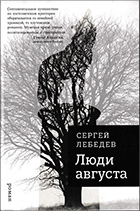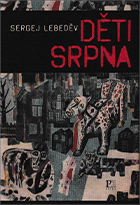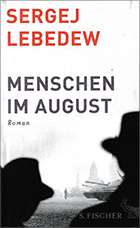Sergei Lebedev
People of August
Proposal
Published by
- S.Fischer, Frankfurt/Main
- Pistorius & Olsanska, Czech Republic
- Helikon, Hungary
- Alpina, Russia
- Creative Angel Publishing, Georgia
- Forlaget Palomar, Denmark
- Keller editore, Italy
- Nilsson, Sweden
- Verdier, France
- Claroscuro, Poland
- Fraktura, Croatia
“Sergei Lebedev’s novel is about the 1990s, and at the same time it is about what is happening in Russia now, and the origin of this collective aspiration backwards, to the past, which has astounded so many people. Back to the familiar embraces of the zone, which as it turns out only seems to be hell to outsiders, while for its own people it is heaven, a place that is fenced off, and accordingly safe.” (Olga Lebdedushkina)
The main character of the novel, who is also the narrator, has long been drawn to the secret of his grandmother Tanya’s life – the daughter of a Tsarist officer whose childhood was concealed from outsiders’ eyes, like a pre-revolutionary postcard, and who was a military nurse in her youth, alongside her surgeon father in the Civil War, when the sight of torn-out tongues and severed genitals no longer made her vomit. Later, she decoded cyphers during the Second World War, thanks to her excellent knowledge of French and German, and then became a proof-reader for the bastion of the party – the Politizdat publishing house. Her diary only concealed one secret – the secret of her love (or was it love?) and even the surname of the grandfather who allegedly went missing in 1942. Who was this person, who unexpectedly came back from the front at night, caroused in restaurants, and from all appearances had women wherever fate took him? Was he an NKVD agent, an informer, a provocateur? Why did he succeed in everything he did? And did Grandma Tanya, who was tired of counting family losses in 1937, simply believe that he, this Soviet devil, with his ability to avoid catastrophe, chose someone who had no biography, or family tree? Love out of desperation, love as a way to save oneself and one’s family?
From the brief notes by his grandmother, which are almost in code, the main character starts to search for his grandfather in the troubled era of the early 1990s – a time of great resettlement of peoples, when old ties fell apart, people lost their friends and families, and found themselves in other countries. A time when the country was swamped with refugees, nomadic traders, dealers and gangsters. Officers of the federal counterintelligence service supervised the illegal collection of meteorites, and military intelligence officers sold emeralds. Some searched for the gold of the Communist party, others for the Amber Room. A time when everything was sold and exchanged for everything else: “combines were exchanged for timber, titanium was sold in Europe in the form of spades, complicated chains of a dozen links were set up, and in the end nails turned into polyethylene for hothouses, the dream of dacha owners. No official papers – only couriers, only cash, only middlemen who put their heads on the line.”
The narrator, having discovered the secret of growing rich on the ruins of the country, could have also become a hunter of fortune, and sell skeletons of ichthyosauruses in America and frozen carcasses of mammoths in Japan, but he becomes a kind of guide to the kingdom of the dead, and looks for the forbidden past: “The profession of looter sickened me: I wanted to connect, and not to destroy, to restore what was lost, and not pilfer what remained.” The hero becomes a “historical psychotherapist” for people who fear their past in the form of relatives who have perished without a trace in the camps, and whose graves must be found in order to appease the evil spirits.
The unhurried Proustian tempo of the novel is interrupted by life, and a thriller begins – brutal, terrifying and exciting. It doesn’t end with the search for Mikhail’s vanished grandfather, because on the ruins of the Soviet empire, every family has its unquiet dead, its unknown graves, its ancestors who have vanished without a trace. The hero roams the entire country, and is not averse to using fake documents from the UN or other international organizations. He almost dies of thirst in the hungry steppe of Kazakhstan, with its one million exiles – Finns, Poles, Russian Germans, Koreans, Kurds and Iranians, Moldavians and Romanians, Greeks, Kalmyks and Ingush, Chechens and Crimean Tatars, in a country of six million people. This was a pocket of the USSR where everything was hidden that needed to be kept secret – from political prisoners and exiles to top-secret factories and rocket testing grounds. It was a one-way street.
Wandering the country in search of the dead, the narrator finds himself in Karelia, where he meets the Dog King. A former camp guard, the dog-keeper did not find a place for himself in the new Russia, and returned to the abandoned camp as the only place where he could live. From neighbouring villages he gathered tramps, homeless children, old prostitutes and mentally retarded people, and recreated the former life behind barbed wire. He managed to create a special breed – a mixture of dog and wolf, but he can only restrain this animal nature at the price of human blood, at the price of sacrifice. After killing the Dog King, and even destroying the memories of the camp in the fire, the liberators discover that they had “destroyed something which they did not understand; an awful, inseparable existence, where everything was combined in one: dogs, people, men, women, flesh and food, bodies and places, dream and reality. However, within this mixture feeling was possible, just as formless, bound together, combining devotion, hatred, love and fear…” The tramps didn’t want to leave. “It even seemed to me that many of them were in some sense even grateful to the Dog King, who gave them a customary form of existence – and hated us, who plunged them once more into a dangerous, uncertain life. I remembered the old people who went to vote for the Communists, this shuffling steps, their sticks and crutches, my hatred for them; now I wouldn’t feel like that.”
“This is a novel about why a fulfilled debt does not bring peace or liberation. The two Russias which Akhmatova once talked about did not look in each other’s eyes, and probably never would. But not out of stubbornness and mutual hostility, but because they were one. The Russia which was imprisoned and the Russia that put people in prisons are a genetic whole. The DNA of almost every Soviet family not only has its own ‘prisoners’ inscribed in it, but also its own ‘person from the secret police’, and sometimes both in the same person, like the main character’s grandfather. So ‘back to the zone’ is a call of the blood.” (Olga Lebedushkina)
At the beginning of the novel, the main character delightedly relates the toppling of the statue of Iron Felix at Lubyanka (the statue of Dzerzhinsky by the KGB building), and the August that promised the birth of a new country: “We won’t repeat mistakes, history will take another path”. How could he imagine that several years later he would be sold a folder of interrogation documents of a political prisoner for $400, and in a special rubbish heap he would find the remains of film of the Karaganda disturbances of 1986? “Security, the old slut, has died! It has no power over me, it has no power over anyone anymore! Its spying tricks have been thrown in the rubbish, the bitch has died, the slut in uniform, its eyes lined with the blue of interrogation nights! The interrogation lamps have gone out, and rats eat its limp, dried-up paper body, and the former servants sell this body to be taken away. I am free of Grandma Tanya’s fear, of her constant anxiety.”
But how mistaken he was, how mistaken all the “children of August” were. The hero realized that little had changed in the country when his patron, with the provoking name Mars, admitted that the raid into Karelia and the killing of the Dog King was merely an order from the top: money had stopped coming in from the timber factory – a black mark on Yeltsin’s election campaign. As he comes close to the fate of his mysterious grandfather, the hero seems to «lure» it to himself, and enters its circles himself. And soon he has to hand over his patron Mars to people with inexpressive faces, the successors of the KGB, in exchange for the life of Anna.
They met in a forensic laboratory in Rostov, where Anna was looking for her father’s corpse – a renowned Chechen lawyer specializing in economic cases and cases involving gold smuggling – an advisor and consigliere to the Sicilian mafia. “And suddenly I saw it was only the old figures in new masks who were working in this field. Could Anna’s father, a lawyer, be a KGB informer? He could.” And who was he himself, who at a safe house was given the case of his Chekist grandfather, who was exiled to Kazakhstan in 1944? The family history completes another circle: “I was supposed to vanish, to protect her from myself, but for the first time I understood with terrible clarity why Grandfather Mikhail, a leper, came to Grandma Tanya in the winter of ’41-’42: a leper also needs a corner, he needs someone – who perhaps without knowing the entire truth – sees a human being in him.” Why Grandfather Mikhail’s son, who grew up inside the camp system and did not wish to repeat his father’s fate, hid from it inside the system, was buried in the forest, and became the Dog King. “And his father took revenge on him, with my own hands, he got him from the other world!”
“It was a strange time of an intermediate period, when Russia seemed to dream itself. The slow dying of Yeltsin, the line of successors – phantoms, people from a matryoshka doll, rabbits out of a magician’s hat; time itself seems to give birth to fantastic projects, inflamed mirages. The market grew, the feeling of a great Field of Wonders returned, which had been forgotten since the war, elections, the possible revenge of the communists.” But a piece of news that seems unimportant at first glance makes the hero turn up the sound on television: “The news was on, the newsreader said that the head of the federal security service [Putin] had been appointed secretary of the security council… Just two years ago, this head of the security council and director of the FSB did not exist in politics, he was just a deputy of the Petersburg mayor, of zero importance. And suddenly he soared, as if he had been created, ignoring reality and the laws of the career ladder. Or had the old millstones started grinding again, had the old mechanisms been launched? Where was the moment after which return became inevitable? This moment did not exist. The statue was taken down, but Iron Felix did not leave Lubyanka, he stood their invisibly. And now we were all inhabitants of the village next to which the Dog King established himself: the past had returned, and we had to live in it.”
“‘People of August’ is the third part of a novel cycle which was written over the past few years, parallel with changes in Russian society, which proceeded at full speed and could not fail to cause alarm. The first book of the cycle, ‘Buried in Oblivion’, was what is known as a ‘novel of warning.’ The second, ‘The Year of the Comet’, is a kind of ‘novel of diagnosis’, a novel of affirmation. The third novel is from a time when both warnings and diagnoses are meaningless, and everything that could happen has already happened… In ‚People of August‘, everything secret becomes clear, but it is at this point that the distressing truth must be admitted: there is no hope.” (Olga Lebedushkina)
Sample translation
A man was running from the forest to the barracks. Actually, we saw a man running, but his gait was not human. It looked as if the man dashing headlong had a hare on him, and the hare kept trying to drop his body onto all fours, to have a more powerful push off, to run twice as fast. The runner did not have a sprinter’s grace, his arms and legs worked in different directions, his head swiveled, but he was so filled and elevated by fear that the fear carried him cautiously and agilely over the fallen trees in the grass, past hummocks and holes.
Dark shadows raced out of the forest edge—one, then another, a half dozen. Dogs running in a herding half circle; they must have been tracking him for a long time, sniffing for the scent, conserving their strength—and now, having caught sight of the fugitive, they ran full out. They didn’t have agility or the feathery tender flight of borzois, but they ran powerfully, heavily, oppressively; they were large dogs the color of dried hay, apparently mixed with wolf blood; the pack was trained and coordinated.
The fugitive did not see or hear them, the dogs ran silently, so fast that their bodies lost their shapes and turned into shadows. They vanished and reappeared in the grass and it seemed that they were not running but moving in bursts, bodily explosions through space. The runner headed for the closest barrack, apparently hoping to hide in it, but the dogs speeded up, the left “wing” of the pack went faster, running ahead to cut him off. Now we could see them better: crazed dogs, interbred with wolves; the most terrible thing to encounter in these woods—a pack like that does not fear humans, you can’t stop it by shouting, or shooting into the air, or with fire.
Mars gave curt orders; Danila ran to the side to mow down the dogs directly behind the runner; Musa and Jalil started shooting. The runner could hardly have understood what was going on, the automatic guns with silencers were almost noiseless, but he saw our figures and fell to the ground; this was not a rational move, a soldier’s instinct—it was just that people scared him as much as the dogs.
The dogs did not stop, did not even break their stride. In the first seconds of shooting, it seemed that the bullets could not take them, either going straight through them or missing completely. The dogs were powered by such force and such thirst for the hunt that—it seemed—each would have to be killed three or four times, or the gunman would have to add something to the bullets, a similar determination, stubbornness, the absolute desire to take the dog’s life.
But then the dogs started to fall. The bullets had hit them, threw them out of the element of running into a dimension when weight, gravity and tired muscles return. Each dog froze for a millisecond, as if in a paused film—and fell, tumbling in somersaults, falling to the side; tufts of fur, spatters of blood, and the disintegrating pattern of the chase. Time slowed down, shifting from the rhythm of the chase to its normal flow, as if the dogs had been tailgating it, speeding it up.
The dogs were dying, and the spirit of the chase was dissipating; the last one, its back legs hit by the volley scraped its front claws on the ground, dragging its wounded body toward the fallen runner.
Musa finished off the wounded dogs; the four of us came over to the runner. The air over his head, riddled by bullets and swirled by their rotation in flight, still vibrated, was unsettled. The runner had either fainted or had fallen into a coma; he lay absolutely still, no tremors, no jerks. He seemed to have expended so much energy that he was locked into his body, as if in a heavy oak log, unable to move even an eyelid.
His clothing was ordinary cotton and oilcloth, but very dirty and greasy, and he wore old sneakers. Nobody wears sneakers in the taiga, only boots; had he known that he would be chased by the dogs, and that you can’t outrun them in boots?
Musa called us; one of the dogs had a freshly stitched ear—it must have been torn in a fight and someone treated the dog. A feral dog, as we thought it, that would never let anyone near it, had been treated, the ear stitched with rough thread, and the dog did not attack the man but let him finish the work.
A half hour later, the fugitive awoke. We had already dragged the dead dogs to the village garbage pit, covered them with lime and some coal from the boiler room. I didn’t like the fugitive; so much so that I suddenly felt sorry for the dogs—maybe we should have let them catch him. Blond, pale, almost an albino; accustomed to the absence of things, he calmly, naturally, settled into the mess as if he had lived the life of a rat; he wasn’t surprised, didn’t ask who we were, but with a suspicious readiness started talking, forestalling unasked questions.
Kirill—for that was his name—confirmed that the dirt road led to a penal colony. Once upon a time, he had done time there—Kirill didn’t miss the opportunity to tell us it was domestic crimes, although that was hard to believe—he worked felling trees.
The prisoners of the colony were “rented out” to various work sites. So one day as he dragged a geodesic tripod around the swamps, Kirill found a small mound; there in the micaceous shale were small corundum crystals, looking like little barrels.
There’s a lot of corundum in Karelia, but these were transparent crystals, close to rubies in purity; Kirill saved that little mound for himself for when he got out, and asked around how much stones like that could cost. He came back five or six years later, with a backpack, tent, and pick, to take samples to show to jewelers—and he stupidly decided to visit his old colony, which he knew had been shut down; it was almost on the way.
He told us he wanted to show off a bit, drink some vodka in the warden’s office, to toast his old pals. He went boldly, knowing no one was there, and he didn’t even have time to be surprised when he was met by a man in a worn convoy guard uniform, with a rifle over his shoulder, and Kirill realized that the former camp—and he knew for sure that it had been closed, he had practically seen the official papers—was inhabited, and there were prisoners, of course, new ones, not the former inmates.
It was run by the man called the Dog Tsar. Kirill knew him when he had been the cynologist in charge of training the work dogs at the colony. For more than thirty years, since his adolescence, the Dog Tsar worked with dogs, with the German shepherds of the convoy and the search team; he lived by the kennels. He never rose high in the ranks, sergeant or second lieutenant, nor did he wear a uniform, preferring his scruffy jacket without insignia. This was a breach of regulations, a staff member without insignia, but the authorities forgave him everything because of his primordial, masculine gift: they called him the Dog Tsar because all dogs obeyed him instantly, even strange ones, bred by others, used to other masters, vicious service dogs trained to hunt down fugitives.
There were rumors—the Dog Tsar himself never spoke of his past—that he was born in the forest village in the west, born in the first year after the war, when deserters of every imaginable army and members of gangs that considered any army an enemy all hid in the woods. The NKVD began “purging” the region, and soldiers with German shepherds on leashes arrived; you couldn’t find people in those thickets without a trained dog, for over the five years of the war the people hiding had learned to dig caches you would just walk past. Once when the Dog Tsar was being awarded some medal, he got a little soft—he had been distinguished!—and mentioned briefly how he when he was a boy he took care of a wounded shepherd, which was called Flame or Fire; when the dog died, because they couldn’t cure it, he felt something, warm and good, as if the dog had thanked him wordlessly in farewell.
They would have laughed at anyone else for this story, but they listened to the Dog Tsar with interest, because they knew how he and dogs got along. They were vicious and smart, they would face knife and pistol without a shudder, nothing threw them off the scent, and they held the trail, no matter how old, as if they smelled like dogs but thought like humans, about where the fugitive might go, might hide, what tricks he would use. He did not let outsiders visit the kennels, he did not take his dogs to shows—they held competitions among colonies on dog handling—he said he didn’t need four-legged athletes, it ruined dogs, got them accustomed to having external praise, they should not work for praise, they should focus their entire canine being into catching violators, because this is the dog’s predestination, to seek, catch, and dig their fangs into the fugitive. The Dog Tsar kept the kennels in order and cleanliness, and he fed the dogs on top grade meat, which he could afford because officers were demoted for every uncaught fugitive and people came from other colonies for his dogs, paying money or trading what he needed. He gave away the dogs reluctantly, saying that a dog needs a collective; and it was true, for two or three years his dogs excelled at the new place and then turned out to be like the other dogs; the ones who stayed with him kept their training to their deaths, and when they became too weak to work, they lived on a pension, like honored four-legged NKVD officers.
At the end of the 1980s, when Kirill was doing his time, things got more relaxed, all the political prisoners were released, and the Dog Tsar grew grim, sensing that major changes were coming. One of the freed zeks—with foresight!—even offered him a high-paying job opening a dog training center for security guards.
The Dog Tsar did not listen to him, but the difficulties with supplies began, and he couldn’t even get good food for the dogs. In the meantime, a cooperative was formed at the colony, with the zeks carving matryoshka dolls that an artist zek painted; then they made fake antique sabers and carved boxes; they sent them off to Leningrad and Moscow, where one of the former inmates was now a well-connected bandit leader and provided a roof for this trade, both in kiosks and from individuals. For now it was matryoshkas and sabers but the officers who had shares in the cooperative were casting an eye on the timber, planning to sell it; the Dog Tsar was marginalized, his work was training dogs, and he became even more of a hermit, practically locking himself in the kennels; but he did not show weakness, he trained the dogs, maybe even more strictly than before.
Then came the coup attempt in Moscow, and eighteen months later there were delays in paying the guards. The Dog Tsar started poaching in order to feed his dogs, and he almost shot the forest ranger who caught him over the bodies of two elk, still warm. Never sociable, he spoke even more rarely with the other officers, he spent more and more time with the dogs, as if consulting them on how to go on, trying to scent how the dogs accepted the new times and what they sensed in the future.
The Dog Tsar refused to leave when the colony was closed down; first he wrote letters to higher ups, thinking that they must not know, otherwise how could this hideous mistake be explained? Then he realized that the generals considered the colony unneeded, that the other penal colonies were enough—and from that moment he did not believe that the state was the state or the police chiefs were police chiefs; he thought that there had been a substitution, everything was fake, and he had to reach someone who like him could still see the truth.
And then, all at once, he stopped suffering mentally and writing his petitions. Something new opened up in him, which he himself did not understand; perhaps he felt for the first time that his life could have been different if he had not put on the police uniform as a youth.
He spent the winter as an anchorite in the abandoned camp, where he kept his kennel and fifteen select German shepherds, and then he shot a lot of fur-bearing animals, bought an old convoy van that had been sold off from his own camp. And then, like a dog catcher, he started driving around the villages and towns on the look out for useless people—unemployed bums, homeless kids who had run away from the institution, slow-witted, invalids, old prostitutes who shouldn’t be working the roadsides anymore. Kirill said that some people were turned over to the Dog Tsar by the residents; tramps made trouble, stealing, camping in abandoned houses; in some places they knew the Dog Tsar, remembered that he was with the police, in others they did not know him but could guess that he was a guard—the area was full of camps and they recognized the screws easily.
The Dog Tsar drove around the region for almost a year, doing his rounds every few weeks. Over that time, no one ever asked who he was, where he was taking people. If he had made just one mistake and tried to take someone who could stand up for himself or was liked by the residents for something, things would have turned out differently; but the Dog Tsar chose only those people whom the villagers and residents would have happily gotten rid of if they only knew how.
Probably, at the start, the Dog Tsar still saw his prisoners as people, the regulations of guard duty were alive in him and kept him from excessive cruelty. A dozen of the stronger men worked the quarry and the timber field, while the rest, unfit for labor, formed the “contingent,” and perhaps the Dog Tsar needed them even more than the workers—the fugitives from orphanages, the retarded, the weary tramps accepted the form of existence he created for them. When he did the evening roll call and the count was correct he even felt well-disposed toward them: simply for being there, in his power, and not planning to escape; however, escape was impossible.
While he lived alone in the former penal colony, he crossed a German shepherd with a wolf. He probably expected an animal as obedient as a dog and as vicious as a wolf; but instead, he became hostage to this new breed that he created.
They did not train well, and only few could stand being on a chain. Yes, he was the Dog Tsar and the dogs obeyed him, just as much as there was dog blood in them. But the wolf blood did not obey, for he was not the Wolf Tsar.
Once, Kirill told us, the new dogs even attacked the Dog Tsar; with Gypsy-like agility and tenacity, he fought them off, bloodying one dog’s head with a shovel. But there were around twenty dogs and he couldn’t chase them away, they considered the colony their territory. The Dog Tsar couldn’t kill them, couldn’t shoot them all, they were his own unreasonable children, he had bred them and took care of them when they were puppies; one of the barracks was theirs and no one except the Dog Tsar went in there or knew what went on in there. The only thing the Dog Tsar managed to teach them was how to guard; if someone tried to escape the colony, one of the dogs would be right there, calling the others with his growls—and they knocked the fugitive down, biting and tearing at him until the Dog Tsar pulled off the leader.
This is probably how he got the terrifying idea. The dogs were breeding, there were more and more of them, and he sensed that soon even his ability and power over dogs would not help—there would be too many of them and he would not be able to hold them with his will and mind, he would miss something, make a mistake, and a foggy idea would appear inside the shaggy heads that he was not the Tsar but just a man; his power was waning, shifting to the dogs. He had to figure out how to make them his pack, how to return his kingdom; and he did.
It happened by accident the first time: two tramps dug a tunnel from the barracks, poured gasoline over their tracks to throw off the scent; at night, when everyone was asleep, they went to the nearby swamp, to the water; the dogs were not in the colony then, they patrolled the forests, herding animals for food, and when they returned, the fugitives had been gone five or six hours.
The tramps had made only one mistake—they left the rags in which they slept, their scent; the Dog Tsar dragged out the rags, threw them to the dogs, and gave them the order to seek. The pack sniffed the filthy, half-rotted shirts and set out reluctantly into the woods; it came back a day later, some of the dogs were limping, for the tramps had made shivs out of 20 cm nails. When the dogs returned, the Dog Tsar sensed that they had changed; they regarded him differently, approached him differently, as if they were back living in the twilight of reason and he had given them the divine meaning of life—hunting; the pack was back in his fist.
Now, every few months when the Dog Tsar felt that the pack’s behavior was becoming unruly, the dogs were reluctant to respond to commands, and anger and the thirst for the hunt were accumulating in them, he assigned them a victim. Naturally, no one wanted to run—they knew the dogs would catch them; but the choice was simple—be thrown to the dogs to be torn apart right there in the camp or at least try to save yourself by running.
Actually, the prisoners could have tried killing the Dog Tsar; but he was too terrifying. Everyone saw his wordless conversations with the male dogs, how the bitches turned over on their backs lovingly, rolling and playing for him. Steeped in dog scent, in a jacket that had absorbed their saliva, blood, and breath, he would step out on the porch, raising his face to the sun—and waves of untamable, hair-raising energy radiated from him, as if he was recharging in the sun, from the currents of warm air flowing along the logs; as if all this—the sunny air, the fluttering leaves, the dry rustle of the pines—was reworked into something that gave him power over the dogs.
The Dog Tsar had to rule the dogs, for that was how he had lived for over thirty years. He had bred and trained innumerable dogs, hundreds, maybe thousands; dogs, their children, grandchildren, great-grandchildren, and great-great-grandchildren; canine generations flowed before him, and he was their master from birth to death. Without his strange talent, without the ability to sense a dog to its guts and liver and rule its irrational will, he would be no one, the lieutenant in the convoy service, a cynologist, one of many; but the new half-breed dogs, the children of dogs and wolves, he felt that they were better; they were too strong for him, the blood flowing in their veins was too ancient and too furious; and he grew tougher managing them, growing more important in his own eyes.
Five times the Dog Tsar organized the hunt for fugitives; five times the pack returned the next day, and once missing a dog. He examined them closely, reading how things went from the tiniest spots of blood on their fur, lashed by branches and splattered with mud.
These hunts must have been seen by berry pickers, who carried the rumor around the villages. No one connected the appearance of the dog pack in the swamps with the Dog Tsar’s pick up rounds; the rumor itself, as it was passed around, changed, and they no longer spoke of dogs but of evil spirits roaming the taiga; they even asked the Dog Tsar to rid them of the evil, seeing him as a protector.
It must be said that the local taiga was responsible in part for the metamorphosis of the rumor. Even though it was low, with no giant trees blocking the sky, there was a wicked enchantment about it. There was too much water there, lakes, rivers, streams, brooks, waterfalls, and springs; you walk through the woods and suddenly dozens of currents, dozens of flows spring up, and the water’s quiet noise created a strange anxiety. The rivers and streams were constantly moving, and this element of movement in the landscape transformed it, made it friable; the excess of lake water, dark, impenetrable, gave the landscape a closed and mirrored aspect, as if there was something else beyond it, secret entrances to another dimension hidden in the dark thickets.
You never felt safe there; you could smell the acrid rotting of the swamps, the necrotic life beneath the surface; the bogs cut off your path, forced you to loop around, turning the landscape into an eternal falling behind, the inability to go straight; the mires pretended to be meadows or mossy places, luring you into a trap, deceit, a mask, not what it seems.
The area disposed the mind to superstition, to reading the images of branches and shadows, to expecting hidden danger. Rumors or evil spirits in the taiga could have arisen on their own, from the flight of a bird, a fish splashing in a whirlpool, evening shadows on the road. Feral dogs from abandoned villages lived in the woods, and that’s what we thought at first when we met up with the Dog Tsar’s hunting pack; they occasionally attacked people. They hunted together, cleverly and deftly, and a person coming across them was frightened not by the dogs, there were some very decrepit ones among them, but by their unexpected training; the dogs formed packs too quickly, losing the habit of obeying people. None of the locals risked mixing it up with them, not even the wolves—they remained animals, while the dogs had formed a new kind of breed, having learned a lot from humans: anger, cruelty, arrogance, and a dead self-confidence, and animals retreated from them. The Dog Tsar tried to tame them, but even he, a dog whisperer, couldn’t do it; it was as if they were no longer dogs but men on four legs.
The rumors suited the Dog Tsar: no one dared go deep into the taiga, to go to the distant berry bogs close to the colony. He gradually came to believe in his rule over a large forest, where he truly was the master and sovereign. The police and the major bandits had no time for him, they didn’t even know he existed; in the small towns and villages they began to show him respect, realizing that in these troubled transitional times something new had appeared and they had to live with it. After all, he had cleaned up the villages, got rid of the tramps and petty drunken thieves, and new ones did not come, learning on the reliable grapevine that it was not safe there. It didn’t seem that tramps had a way of sending messages to one another, but they learned what was necessary, maybe leaving special signs, and peace reigned in the villages.
He was considering collecting protection money from the villages, bringing them into his fiefdom; also taking over the illegal loggers. Slowly, heavily a different person was forming, with a masterful character and a mad twist, for he saw his power not over humans but over dogs, and he wanted to breed them so that there would be hundreds of them. People thought that the former camp guard knew that everything would return when the colony was shut down and they considered him a prophet, or a secret watchman, one of many in needed sites, in the camp zones and in undisclosed factories, to wait for the resurgence of the Soviet Union; it was just that they hadn’t heard about the other ones.
Somewhere in the Big Country the Parliament was burning, wars were started, but here in the quiet of the forest a seventeenth-century character was growing, a rebel tsar for all Russia. He had no concept of power, mentally he was still a lieutenant of the interior forces, and probably his mind had gotten soggy, he became superstition, he was no longer led by his mind but by ancient instinct; the Dog Tsar had penetrated deeper than others into the new times, he scented it, let it inside, and it changed him, stunned him like a revelation.
… Kirill had not recovered from the fear, the dogs at his back and the bullets headed practically into his face. If he had been calm, he would have told the story differently; this way, it was clear that he was not just one of the Dog Tsar’s prisoners.
“The Dog Tsar made you a partner?” Mars asked.
“Yes,” replied Kirill. “It’s not complicated. He realized straight off that he could do business with me. A zek and a screw, but we worked together.”
“You didn’t run away?” Mars asked.
“What for?” Kirill said. “He hung a word on me, like a lock—the dogs simply did not see me, as if I were one of them or a tree. There was good money to be made. But he was crazy, really crazy. I told him let’s get rid of these goners and get some normal”—he almost said slaves, but corrected himself—“workers. And he decided to get rid of me.”
“Now I’ll tell what really happened,” Mars said. “You were an informer, maybe even a supergrass. You know too much, you were working for the authorities. You’re lying about the corundum. You came back to set up a business at the colony, start a logging concern. But the place was taken. So you went to work for the Dog Tsar—he must have known you were an informer, one of them, so to speak. And you were on the lookout for a way to get rid of him. But he sensed it, you’re not able to hide your rotten plans.”
Kirill was scared and angry.
Mars nodded at Danila, who moved his automatic to get Kirill to stand.
“Let’s put him in the same hole as the dogs,” Musa said.
“That’s the place,” said Danila.
I knew that the mercenaries were putting on a show, there was no reason to kill Kirill, but for a second I also believed that they would shoot the fugitive behind the barracks.
Kirill must have counted on us taking him on as a guide. Now he trembled, his lips quivered, and his fingers crumpled the edge of his oilcloth jacket. But I felt that Kirill had not given up, somewhere inside he was clenched, with a small but fierce hamster hatred that would not let him beg for mercy.
Danila did not take him to the pit but shot a round over his head so that rubbish fell from the walls of the barracks. Kirill bent over and froze, he had wet himself, a warm stream dribbling down his leg. The soldiers laughed, Mars frowned.
“All right, you can live and come with us,” said Mars. “Show us how things are in the colony, and we’ll let you go.”
Kirill nodded silently and enthusiastically. But I thought we were making a mistake in bringing him with us; we should have shot him here—he was petty but vengeful and therefore dangerous. But Mars had already shouldered his automatic, ready to go. He saw the goal ahead, a justification for his leave from Moscow; I felt sorry for the Dog Tsar.
Translated by Antonina W. Bouis
